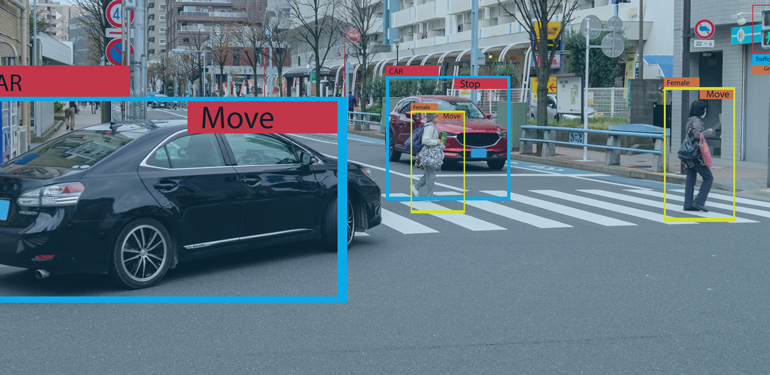Academics / Graduate Study / MS Programs / SpecializationsComputer Vision and Image Processing
Computer vision (CV) and image processing are two closely related fields that utilize techniques from artificial intelligence (AI) and pattern recognition to derive meaningful information from images, videos, and other visual inputs. Image processing is at the helm of the technical revolution that is being called Industry 4.0, laying the framework for new technologies in image data processing and object recognition. Image processing algorithms are used to extract information from images, restore and compress image and video data, and build new experiences in virtual and augmented reality.
Computer vision uses image processing to recognize and categorize image data. In fact, CV is becoming more adept at identifying patterns from images than the human visual cognitive system. CV technology is being used across industries from healthcare and media to gaming and transportation. For example, vehicles use CV to track objects and surroundings and to enable driver assistance system and autonomous navigation. Security systems use facial recognition and object detection in video surveillance. Medical devices use image classification to identify and diagnose conditions. In sports, object and motion tracking is used to follow balls and players. Drones with sophisticated cameras are used in agriculture to monitor the health and yield of crops.
As computer vision and image processing technologies continue to pave the way for advances in artificial intelligence systems, experts in these fields will continue to be in high demand. In this track, you will gain the technical skills and in-depth knowledge to develop algorithms that automatically extract and analyze high-level information from images, videos, and other types of high-dimensional data.
Program Details
Core Courses
Select at least six courses from the following list:
- CE 355 ASIC and FPGA Design
- CE 387 Real-Time Digital Systems Design and Verification with FPGAs
- EE 332 Introduction to Computer Vision
- EE 335, 435 Deep Learning Foundations from Scratch
- EE 359 Digital Signal Processing
- EE 363 Digital Filtering
- EE 375, 475 Machine Learning: Foundations, Applications, and Algorithms
- EE 418 Advanced Digital Signal Processing
- EE 420 Digital Image Processing
- EE 422 Random Processes in Communications and Control I
- EE 431 Human Perception and Electronic Media
- EE 432 Advanced Computer Vision
- EE 433 Statistical Pattern Recognition
- EE 435 Deep Learning Foundations from Scratch
Elective Courses
Select up to six courses from the following list:
- BME 325 Introduction to Medical Imaging
- CE 392 VLSI Systems Design Projects
- CE 395, 495 Connected and Autonomous Vehicles: Challenges and Design
- CS 329 HCI Studio
- CS 330 Human Computer Interaction
- CS 396 Natural & Artificial Vision
- EE 395, 495 Biometrics
- EE 395, 495 Computational Photography Seminar
- EE 395, 495 Geospatial Vision and Visualization
- EE 395 Adaptive Signal Processing and Learning
- EE 395, 495 Machine Learning for Medical Images and Signals
- EE 420 Digital Image Processing
- EE 421 Multimedia Signal Processing
- EE 495 Optimization and Learning in Stochastic Dynamic Environments
More in this section
- Artificial Intelligence and Machine Learning
- Network and Communication Systems
- Quantum Computing, Sensing & Communications
- Robotics and Autonomous Systems
- Specializations
- Cybersecurity
- Photonics & Optoelectronics
- Embedded Systems
- High-Performance Computing
- Internet-of-Things & Edge Computing
- Semiconductors
- Sustainable Energy and Low-Power Design


